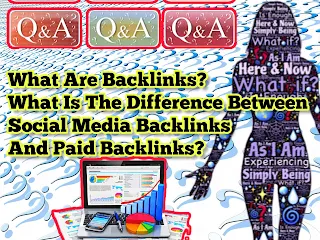Q. What Are Backlinks? What Is The Difference Between Social Media Backlinks And Paid Backlinks?
Backlinks are an essential component of search engine optimization (SEO) and refer to hyperlinks from one website to another. They play a crucial role in determining a website's authority, trustworthiness, and search engine ranking. In this 1000-word essay, we will delve into the intricacies of backlinks, focusing on the key distinctions between social media backlinks and paid backlinks.
Understanding Backlinks
Backlinks are akin to digital endorsements. When one website links to another, it's essentially vouching for the quality and relevance of the linked content. Search engines like Google interpret these links as votes of confidence, and websites with a greater number of high-quality backlinks tend to rank higher in search engine results pages (SERPs).
There are several important factors to consider when evaluating backlinks:
1. Source Authority:
Backlinks from reputable websites carry more weight in boosting a site's SEO. For instance, a link from The New York Times is more valuable than one from a lesser-known blog.
2. Relevance:
The content on the linking page should be thematically related to the content being linked to. Relevance signals to search engines that the link is natural and not manipulative.
3. Anchor Text:
The text used in the hyperlink (anchor text) should ideally describe the linked content accurately. This helps search engines understand the context of the link.
4. Diversity:
A diverse backlink profile, including links from various domains and types of websites, is generally more beneficial than a concentration of links from a single source.
Social Media Backlinks
Social media backlinks are links to your website or content shared on social media platforms like Facebook, Twitter, Instagram, or LinkedIn. While these links can contribute to your overall online presence and may indirectly impact SEO, they are fundamentally different from traditional backlinks from websites.
Pros of Social Media Backlinks:
1. Increased Visibility:
Social media platforms have massive user bases, which can expose your content to a wider audience.
2. Traffic Generation:
Social media backlinks can drive direct traffic to your website, potentially leading to conversions.
3. Engagement and Brand Building:
Social media platforms allow for direct interaction with your audience, fostering brand loyalty and engagement.
However, it's important to note that social media backlinks have limitations:
1. No SEO Authority: Social media platforms use "nofollow" tags on external links, which means search engines like Google do not consider these links for SEO ranking.
2. Short Lifespan: Social media posts have a short lifespan, and links shared on these platforms can quickly become buried by newer content.
Paid Backlinks
Paid backlinks, as the name suggests, involve paying other websites or entities to link to your site. This practice is generally frowned upon by search engines and can result in severe penalties if detected.
Pros of Paid Backlinks:
1. Quick Results: Paid backlinks can potentially provide quick improvements in search engine rankings.
2. Control Over Anchor Text: You have control over the anchor text used in the paid links, allowing you to optimize for specific keywords.
Cons of Paid Backlinks:
1. Risk of Penalties: Search engines like Google actively penalize websites that engage in paid backlink schemes. Penalties can range from lowered rankings to complete deindexing.
2. Lack of Trustworthiness: Paid backlinks are often viewed as manipulative and can harm a website's reputation.
3. Temporary Gains: Any SEO gains from paid backlinks are typically short-lived. Once search engines detect the manipulation, rankings can plummet.
In summary, backlinks are crucial for SEO, serving as endorsements of a website's trustworthiness and authority. Social media backlinks, while valuable for visibility and engagement, do not directly impact SEO rankings due to "nofollow" tags.
On the other hand, paid backlinks, which involve financial transactions for links, are risky and can lead to penalties from search engines. It's essential for website owners and marketers to focus on earning high-quality, organic backlinks through valuable content and ethical practices, as this is the most sustainable and effective way to improve SEO rankings and online visibility.




Post a Comment